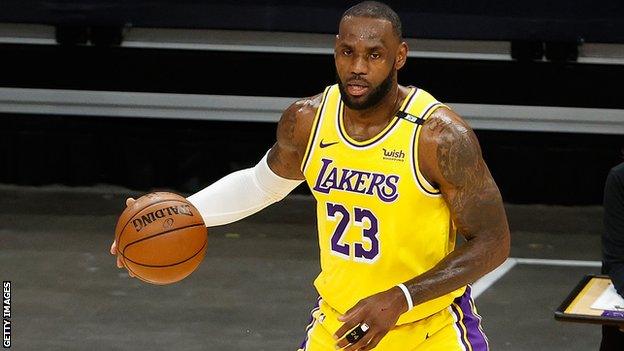LeBron James got coronavirus vaccine after initial scepticism
- Published

LeBron James' LA Lakers won the NBA title in 2020
Basketball great LeBron James says he decided to get the coronavirus vaccine because it "best suited" him, his family and his friends.
The 36-year-old Los Angeles Lakers star said he researched the vaccine before receiving it, having originally been "very sceptical".
It has been reported 90% of NBA players have been vaccinated, external prior to the new season beginning on 19 October.
Some have refused to confirm their status or say they will not be jabbed.
James said it was not his place to judge others, or persuade people to get the injection.
"I don't talk about other people and what they should do," said the four-time NBA champion.
"I know that I was very sceptical about it all but after doing my own research I felt like it was best suited for me and my family and my friends.
"That's why I decided to do it."
The NBA does not require players to receive a vaccine, but they will be subject to local health protocols.
New York requires people over the age of 12 to have at least one dose of a vaccine to attend indoor events, including sporting events, while fans in San Francisco cannot attend indoor events unless they are fully inoculated.
New York and San Francisco also require professional athletes to show proof of one dose to play indoors, unless they have religious or medical exemption.
Andrew Wiggins will not be able to play home matches for the Golden State Warriors after the league rejected his request for a religious exemption.
Washington Wizards' Bradley Beal said he was unvaccinated for "personal reasons", while Kyrie Irving of the Brooklyn Nets said he would keep his decision private.
"I don't feel like I should get involved in what people do for their bodies and their livelihoods," James said.
"You're talking about individual's bodies. You're not talking about something that's political, or racism, or police brutality. You're talking about people's well-being.
"I know what I did for me and my family. But as far as speaking for everybody and what they want to do, that's not my job."

You're Fired Down Under! The Apprentice Australia is streaming now
The Last Mountain: Stream the story of mother and son who made the same unforgiving journey 25 years apart
